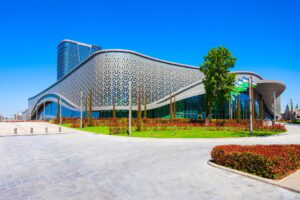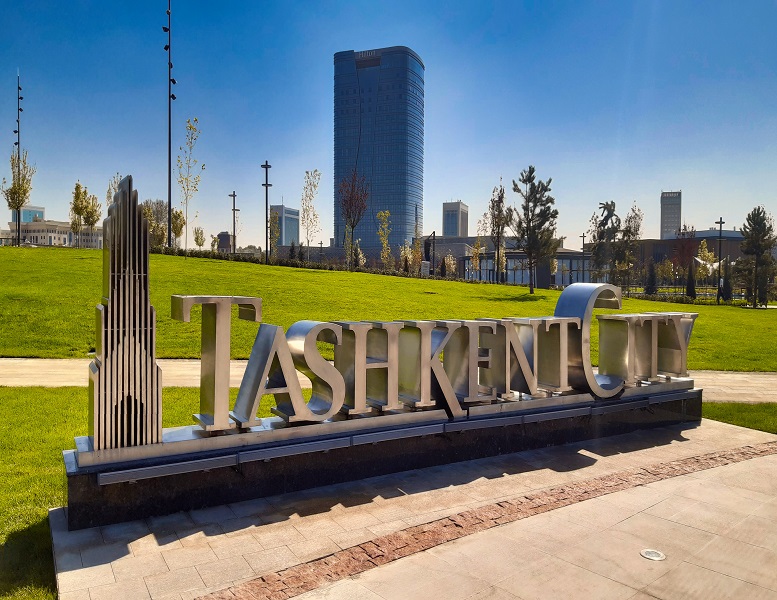It seems that “attracting” immense inflows of foreign direct investments (FDIs) has become one of the key strategic “priorities” of President Shavkat Mirziyoyev’s “prosperous” Uzbekistan. Due to Mirziyoyev’s integrated economic policies and diversified productive channels along with state’s sovereign guarantees, building of free economic zones, tax incentives and provision of a business and investment friendly environment, Uzbekistan has become one of the “hottest” destinations of the foreign companies and investors in Central Asia.
Thus FDI has become a new economic “norm” in Uzbekistan transforming its diverse sectors of economy, joint ventures, production channels, hybrid agriculture, qualitative industrialization, e-commerce, digitalization, modernization and last but not least, green technologies.
The most recent announcement of the Ministry of Investment, Industry, and Trade of the Republic of Uzbekistan (MIIT) about holding of fourth annual Tashkent International Investment Forum (TIIF), the most significant international economic event, on June 10-12, 2025 at the Central Asian Expo (CAEx) vividly reflects “strategic” importance, scope and utility of the FDIs in the country.
Additionally, according to Uzbek official figures, the attraction of more than US$90 billion in foreign investments contributing to a 6% GDP has been achieved. It is estimated that by 2030, Uzbekistan’s economy is expected to reach US$200 billion, with foreign investments playing a key role in this growth.
It is pertinent to mention that the TIIF has been dubbed as one of the most significant platforms for engaging with investors and further enhancing Uzbekistan’s investment potential by many international prominent publications. It is a good omen that over 2,500 participants from 93 countries, and agreements worth a record-breaking US$26.6 billion were signed during the third TIIF 2024. Cumulatively, during its three editions 357 investment agreements have been concluded, totaling US$44 billion. Remarkably 57 projects have already been implemented, while 263 are in the advanced construction and planning phases.
Auspiciously, Saudi Arabia has been the largest investor, with agreements worth US$10.7 billion. Other major investors include China (US$7 billion), Russia (US$5.5 billion), the UAE (US$4.6 billion), Türkiye (US$3.6 billion), Germany (US$3.4 billion), and France (US$2 billion), along with several other countries vividly reflecting Uzbekistan’s diversification of investments.
Hopefully, the 4th TIIF will also be a “historic” event, showcasing an investment exhibition for the first time. Leading private companies will display their projects, while Uzbek enterprises will have an ideal opportunity presenting their products and potential to international investors. Thus it will provide a mutually befitting platform for all exploring new avenues of cooperation and coordination in the days to come.
Obviously it has a “holistic” and “comprehensive” agenda covering all aspects of panel discussions, strategic negotiations, and business meetings. Definitely, the development of SMEs, industrial production, global supply chains, automotive and machinery manufacturing, and the electrical engineering sector will also include “alluring” businessmen and investors to make investment in Uzbekistan the new land of prosperity, progress and productivity.
Moreover, special attention will be given to water resource management, legal protection of investors, fintech, e-commerce, green energy, privatization, investment reforms, urban development, and digitalization projecting real essence and potential of Uzbekistan macro-economy achieving new wonders in every sector of smart economy and modern production units integrating its economy towards greater stability, sustainability, innovation, digitalization and green transformation.
Evidently, the plenary session of the Foreign Investors’ Council under the President of Uzbekistan, scheduled for 11 June will be one of the “biggest” attractions of the TIIF bringing together CEOs from leading global corporations and international financial institutions for an open, transparent and integrative dialogue with the policy makers and government, focusing on enhancing the investment climate, improving the business environment, and discussing specific initiatives to boost the country’s investment attractiveness.
It hopes that more than 3,000 participants, including representatives of international financial organizations, policymakers, economists, top executives from leading corporations and investment funds, as well as experts in sustainability, innovation, and digital transformation will rigorously participate in the 4th TIIF confirming its economic, business, investment vastness through collaborative mechanism and constructive competition creating win-win propositions for all.
According to reliable diplomatic sources the government of Uzbekistan will present various sectors including energy, infrastructure, agriculture, tourism, mining and the digital economy during the 4th TIIF serving as a platform to showcase the country’s high-growth potential, facilitate strategic partnerships, and discuss global economic trends.
In summary, the 4th TIIF will highlight Uzbekistan’s strengthening position as a dynamically developing investment hub in Central Asia by taking decisive measures to improve the country’s investment and business climate, removing all barriers.
It is a healthy indicator that Uzbekistan has nearly doubled in recent years, with 6.5 percent GDP growth in 2024 the highest in the Central Asian region. Trade turnover continues to grow steadily, and over $90 billion in foreign investments have been attracted.
It seems that the TIIF has become a real tool for attracting investments, forging strategic partnerships, and discussing global economic trends in Uzbekistan.
The writer predicts that TIIF 2025 will focus on strategic sectors, investment opportunities, legislative/structural reforms and business climate improvements. The SMEs, industrial development, automotive, electrical engineering, machinery sectors, water resource management challenges and innovations, investor protection and legal system modernization, Fintech and e-commerce development, green energy and sustainable development, privatisation and investment reforms, urban development and infrastructure modernization, textile and chemical industry value chains and last but not least, digitalisation and AI as new business frontiers will be tabled and thoroughly discussed. 
The writer suggests that tourism, hydrogen power generation, infrastructure development projects, integrated transport system, railways, dairy farming, green plantation, restoring deserts into green fields, disaster management, climate change, lithium batteries, EVs, and peaceful nuclear power generating projects should also be included in the list to be presented and discussed in the upcoming 4th TIIF.
The writer proposes that the policy makers of Uzbekistan should more focus in green energy, banking & financial sector, Islamic Banking, metals & minerals, rare earth assets, quantum & big data technologies, health, biomechanical industries and services sector should also be showcased for attracting more and more inflows of FDIs.
The writer concludes that the policy makers of Uzbekistan should take all possible measures to reduce fiscal deficits, improve domestic banking industry and lessen contingent liabilities from state-owned entities. Thus role of a vibrant private sector, country wide development of the youth entrepreneurship, growth of skilled/technical education, reducing gap between universities and industries, formation of knowledge based economy focusing on improving economic institutions, enhancing spending efficiency, and boosting total factor productivity would also be systematically pursued and implemented to achieve the desired goals of New Uzbekistan & Prosperous Uzbekistan.


